Job hunting is stressful enough, especially with so many people competing online, all trying to stand out among a sea of applicants. But there’s an unexpected hurdle making it even harder for many—‘ghost jobs.’
Recently, digital creator Ceros Whaley took to TikTok to shed light on this issue. ‘Ghost jobs’ are fake postings that companies put up, misleading countless hopeful job seekers who are simply trying to land a position.
Below, you’ll find Whaley’s explanation of how this happens and why it’s becoming such a common problem.
According to this hiring manager, the job you applied for might not exist

Image credits: Austin Distel / unsplash (not the actual photo)
“I got fired from my second job ’cause I wouldn’t post a ghost job. So, let me explain what I do for my second job, what I did for my second job. I was a hiring manager. I usually just post job listings sometimes on Indeed or other job listing websites for my company. I’m not gonna explain what company that is ’cause I can’t do that, but I am gonna talk about what I can talk about ’cause I read through my NDA.
I used to post ghost jobs, which are fake jobs to encourage our current employees to work harder. These jobs will be fake jobs, so you could apply for the listing but not actually get hired. They’re called ghost jobs. You’re probably wondering, ‘I apply for all these places, why am I not getting callbacks?’
You might have applied for a ghost job, which isn’t a real job, it’s just put there to show that we’re looking for new hires at higher rates to get our current employees to work harder, as an incentive to make them work hard as opposed to increasing the base pay or the base rate. And I’ve made maybe 300 ghost job listings. I’ve made a lot. I’ve made so many it’s insane. And what messes me up is that they’re still doing it.”
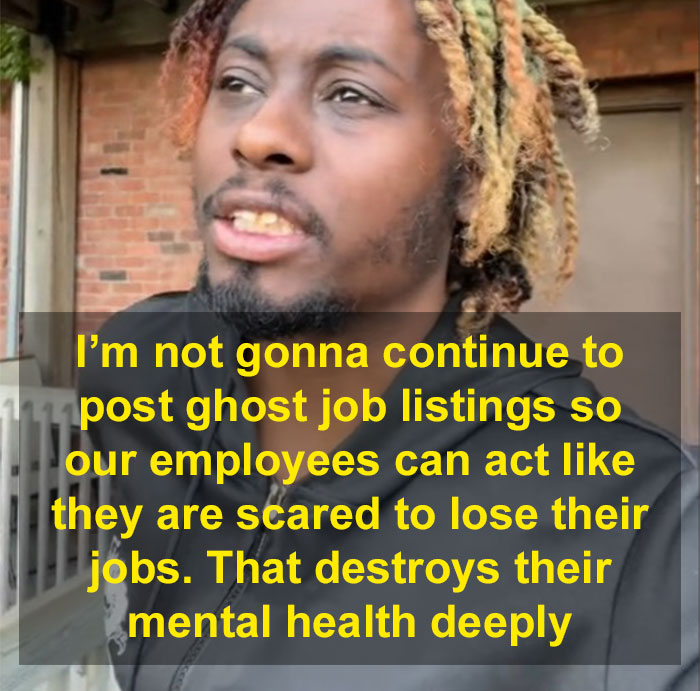
Image credits: ceroswhaley
“I got into a little bit of a scuffle, a fracas one might say, with my previous hire manager. My hire manager said, ‘Hey, you stopped posting ghost jobs. Look, what’s going on buddy? It’s really working. It’s helping our team morale.’
I said, ‘Listen, I don’t feel good about doing this.’ Might be the first time I’ve ever said that. Usually, I have like no morals, no ethics about anything. I just didn’t feel good at all about doing it, despite the fact that I was getting a massive bag from it, and he said, ‘Well, we need somebody to do it, and you’re the best we’ve got.’
I’m not gonna continue to post ghost job listings so our employees can act like they are scared to lose their jobs. That ruins, destroys their mental health deeply. And he said, ‘That’s HR’s job, not ours.’ So I’m talking to him and I’m arguing, and at this point, he’s shouting. I’m calm.
So I’m thinking I can take it to HR, and he says, ‘You know we’re probably gonna have to talk about this later, but you should clock out for the day.’ I said, ‘I don’t wanna clock out for today, because we’re not done talking about the specific issue.’ This is insane, this is psychotic. So I go cool off. I talk to my friends on Discord, we’re cooling off, we’re talking about it.”

Image credits: Resume Genius / unsplash (not the actual photo)
“Then one of my friends does the same job as I do. He also posts ghost jobs. And it’s disgusting. It’s not just my company, it is every company I’m seeing doing this: it’s Walmart doing this, it’s Amazon doing this, I’m not gonna disclose my company, but it’s Best Buy doing this.
They’re posting these fake job listings to trick you into thinking ‘Oh well, they’re hiring a bunch of other things.’ Or because just in case you’re looking to move to a new job or talking about needing a pay raise. And they’ll post a new job at a higher rate. Say you got hired at $17 an hour, they’ll post a ghost job at $22 an hour. And if you try to apply for that, they’ll clock you for that, and they’ll know it’s you ’cause they got your Social Security number.
It is a disgusting business practice ’cause as soon as you apply to get a higher position or anything like that, they’ll talk to you about it and they’ll ask you, ‘Why do you want a higher position? Do you want more pay? Are you dedicated to the company?’ They’ll give you a performance review, they’ll check everything about you just to see.”
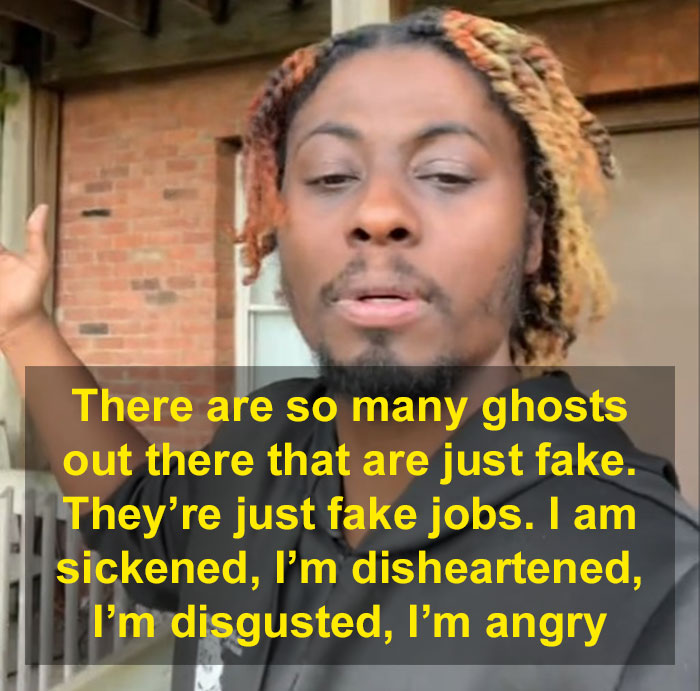
Image credits: ceroswhaley
“I recommend, this is my honest opinion, this is my honest recommendation, doing the bare minimum at jobs. I mean, bare minimum. Just coast by, doing the bare minimum at jobs. Don’t try to do anything extra or crazy, just coast by, doing the bare minimum at jobs. I’m so serious.
Because I didn’t know there was so much of it. I thought it was just my job doing this. I thought we were like the monopoly on doing this, that’s what I thought. But I’m applying to other jobs, I’m applying to other places, and I’m noticing the ghost jobs. I’m noticing that there are many of them. There are so many ghosts out there that are just fake. They’re just fake jobs.
I am sickened, I’m disheartened, I’m disgusted, I’m angry ’cause I don’t have my second job anymore, by the way. It was a small job, I worked 20 hours a week just doing the analytics and the hiring for our company, that’s all I did. I still work at Amazon, but man, I’m just sickened. Amazon doesn’t care about what I post, by the way. They’re fine with me doing whatever. Amazon doesn’t check anything I do, they don’t care about me at all, but man, this is stupid, this is weird. Look up ghost jobs, just look them up.”
You can watch the full video here
@ceroswhaley #fyp #storytime #job #foryou #viral ♬ original sound – CerosWhaley
Over a third of job advertisements are fake
Ceros Whaley’s experience might sound surprising, but it’s part of a larger, ongoing practice that many aren’t aware of. A recent survey conducted by MyPerfectResume, which included over 700 recruiters in the U.S., revealed a startling statistic: 81% of recruiters admitted to posting ghost job ads. This means that more than a third of all jobs posted online—about 36%—aren’t real vacancies.
Bored Panda reached out to industry experts Renata Junkova and Hannah Salton to learn more about why this happens and how people can protect themselves from these misleading listings.
One reason companies use ghost jobs is to test the market and gauge the available talent. “This is common among small companies and startups that are uncertain about their direction,” says Renata Junkova, career and executive coach, founder of Runway Excellence, and creator of the Career Pulse Newsletter. “By posting these ads, they can assess whether it’s worthwhile to hire someone new or if existing staff can handle additional responsibilities.”
In other words, they’re putting out feelers for potential openings. As career coach Hannah Salton, author of Graduate Careers Uncovered, explains, “A company may not have a specific job available at the moment, but they anticipate needing to hire in the future. Posting a job ad allows them to see what the candidate pool looks like.” This also helps them assess whether it’s worthwhile to hire someone new or if existing staff can handle additional responsibilities, Junkova notes.
Another tactic companies use is to conduct market research. “They might be testing which job ads are most effective, or they could be trying to boost their brand’s visibility,” says Salton.
In some cases, companies even use interviews to gather insights from candidates. “Especially in startups, they might assign projects during the interview process to benefit from the candidates’ ideas and strategies, which can be unethical,” adds Junkova.
For roles with high turnover, such as retail or hospitality positions, companies often maintain continuous job ads to keep a pool of applicants ready for quick hiring. Junkova also notes that companies sometimes have a preferred candidate in mind, like an internal employee or a referral, but still post the ad publicly to comply with company policy or to see if an exceptional candidate applies.
An even more concerning practice is posting ghost jobs to collect personal data for fraudulent purposes. “People might create fake ads to capture applicants’ personal details for scams or to sell their data,” says Salton. If you’ve noticed an increase in spam emails after applying for jobs, this could be why.
Overall, these practices mislead job seekers and waste their time, which is why it’s crucial to be aware of these tactics, according to Junkova.

Image credits: Vlada Karpovich / pexels (not the actual photo)
How to spot ghost job listings and land a real offer
To steer clear of ghost job ads, Junkova suggests looking out for these red flags:
- Posting Date: If a job ad has been up for weeks or even months, it could mean the company isn’t serious about hiring or is just collecting resumes for future use.
- Vague Job Description: Be cautious if the ad doesn’t clearly outline the role’s main duties, responsibilities, or the company culture. This could indicate that the job doesn’t actually exist.
- Company Reviews: Check the company’s reviews on sites like Glassdoor to see what other candidates have said about their interview experiences. Negative reviews could be a warning sign.
With the competitive job market, you might wonder if you should still apply for all listings just to increase your chances. However, both Salton and Junkova emphasize the importance of human connections over mass applications.
“As a career coach, I generally advise people to favor networking over applying to job postings—fake or not,” says Salton. “Building relationships with individuals who work at your desired company is generally more effective than submitting a high volume of generic applications.”
It may take more time and effort, but it can set you apart in the long run, especially with the help of social media networks. “Don’t be afraid to reach out directly to decision-makers on LinkedIn,” says Junkova. “It might feel awkward at first, and you may need to step outside your comfort zone, but this direct approach can be surprisingly effective.”
Your strength as a candidate will increase in the eyes of companies if you take the time to research and send a personalized, concise message, including a clear call to action, like suggesting a quick chat. Employers notice when someone makes the first move with genuine enthusiasm and intent.
“Remember, companies value bold candidates who confidently pursue what they want,” Junkova adds.

Image credits: Vlada Karpovich / pexels (not the actual photo)
People in the comments acknowledged how frustrating it is to deal with ghost job listings, both as employees and job seekers
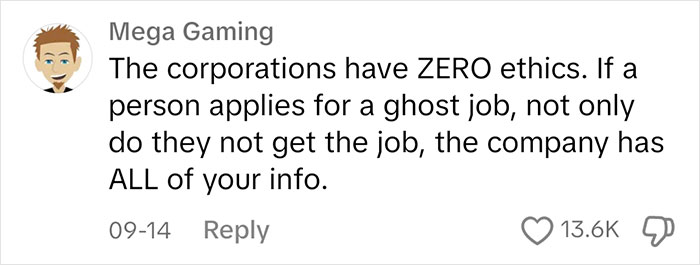


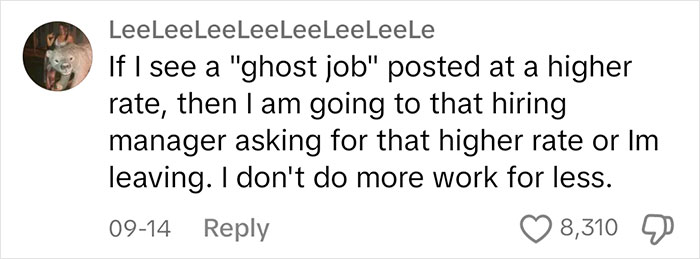
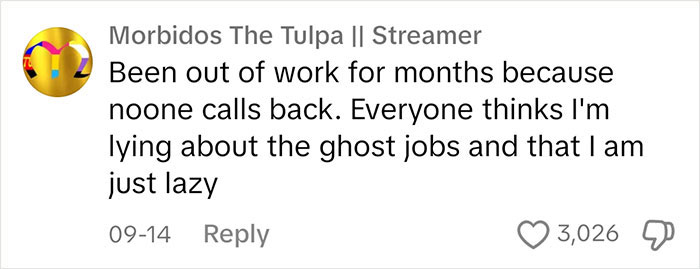
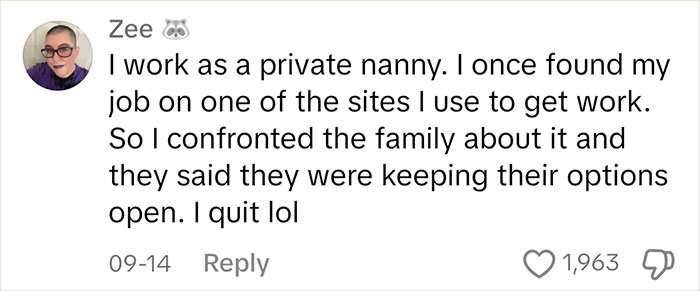
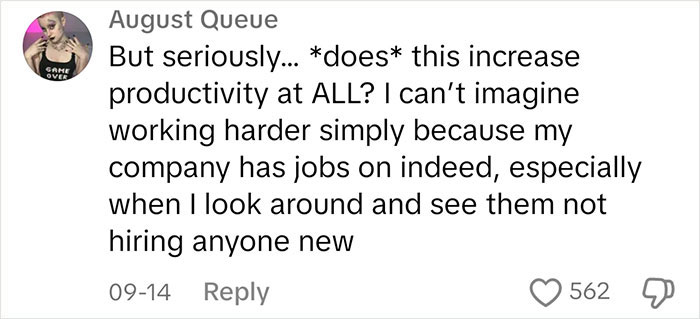





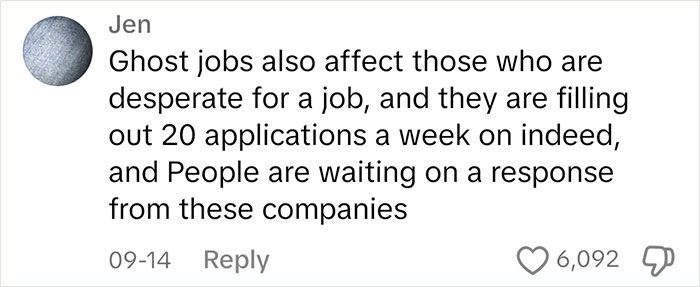

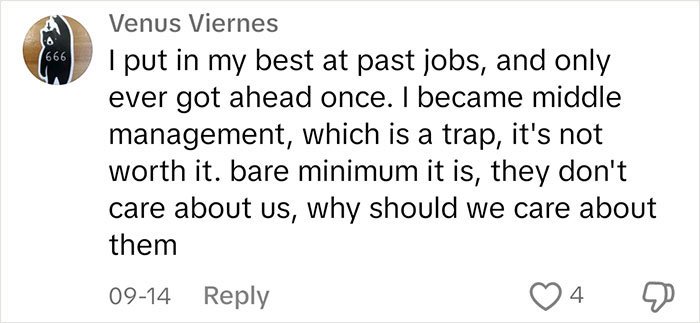
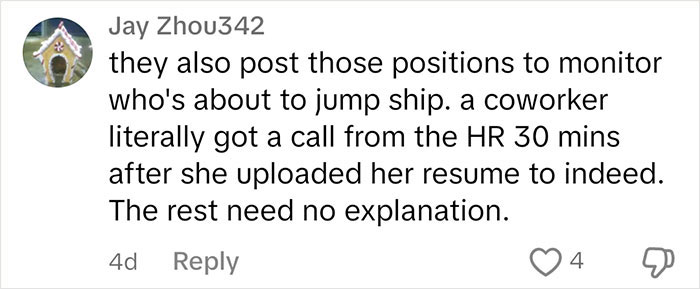
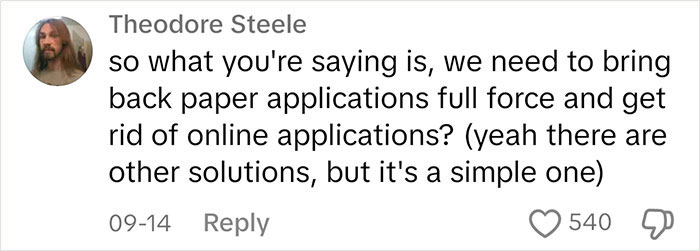

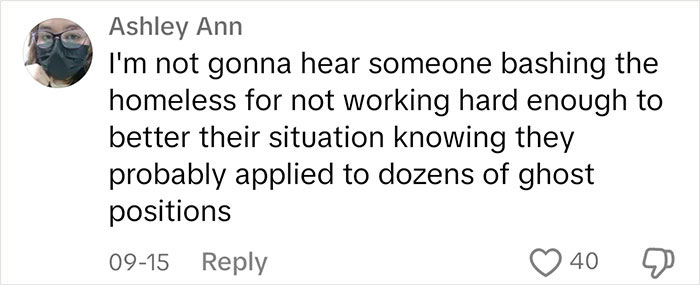
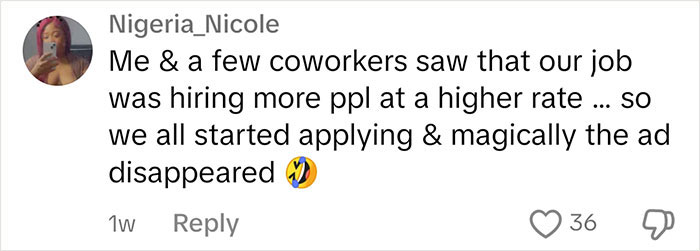
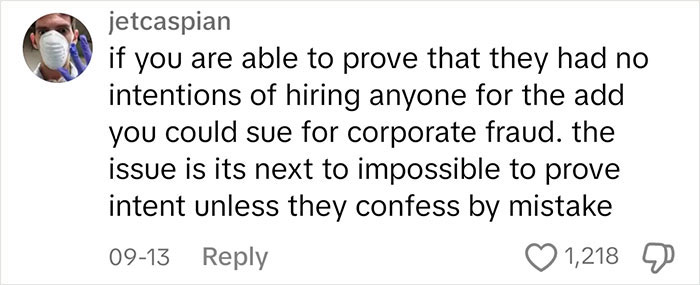
Whaley also posted a follow-up video with additional tips on how to avoid falling for ghost jobs
Guy Gets Fired For Refusing To Post “Ghost Jobs,” Goes Viral Exposing The Toxic Trend Bored Panda@ceroswhaley Replying to @Aυƚιʂƚιƈαʅʅყ.Dɾιʋҽɳ 🥀꧁༺༻꧂🖤 #fyp #jobs #manager #reply #replyingtocomments #viral ♬ original sound – CerosWhaley







